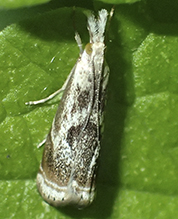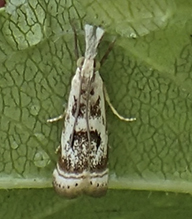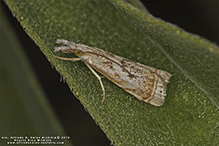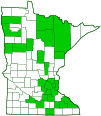elegant grass-veneer
(Microcrambus elegans)
Conservation • Description • Habitat • Ecology • Distribution • Taxonomy
|
||||||||
| Hodges # | 5420 |
|||||||
Conservation Status |
||||||||
| IUCN Red List | not listed |
|||||||
| NatureServe | NNR - Unranked SNR - Unranked |
|||||||
| Minnesota | not listed |
|||||||
Description |
||
Elegant grass-veneer is small crambid snout moth. It occurs in the United States and southern Canada east of the Great Plains, and in Mexico. It is the most common Microcrambus moth in the United States, and is common in Minnesota. Adults are found from June to August in fields and grassy areas. Larvae feed on grasses. Adults are narrow-bodied. They are 5⁄16″ to ⅜″ (8 to 10 mm) in length and have a wingspan of ½″ to ⅝″ (12 to 15 mm). The forewings are white or silvery white with brown and dark brown markings. They are moderately to densely peppered and shaded with brown and dark brown specks. On each wing, there is a conspicuous, dark brown, triangular patch near the wing base, and a broad, curved line in the middle. Dense, dark brown specks in the postmedial area provide a dark shading below the curved line. When the wings are closed these marks form a frowning face that has been compared to a Halloween mask. There is a brown band in the postmedial area and a thin, straight, brown line in the subterminal area (subterminal or ST line). The band is separated from the ST line by a thin white border. There are seven short, blackish-brown dashes, one on each vein, between the ST line and the fringe. The fringe is brown. The hindwing is brownish-gray and has a wide fringe. The antennae are slender and thread-like. There are two large compound eyes on the side of the head and a single, well-developed, simple eye (ocellus) near the top edge of each compound eye. The finger-like sensory organs (palps) attached to the mouth are moderately long and densely hairy. They are projected forward, appearing like a fuzzy snout. |
||
Size |
||
Total length: 5⁄16″ to ⅜″ (8 to 10 mm) Wingspan: ½″ to ⅝″ (12 to 15 mm) |
||
Similar Species |
||
Habitat |
||
Fields and grassy areas |
||
Ecology |
||
Season |
||
One generation per year. June to August |
||
Behavior |
||
Adults rest with their wings held tight to the body, forming a tubular shape. They are active at night (diurnal) and at dawn and dusk (crepuscular), and will come to lights. |
||
Life Cycle |
||
|
||
Larva Hosts |
||
Grasses |
||
Adult Food |
||
|
||
Distribution |
||||
|
Sources |
|||
| 10/22/2022 | ||||
Occurrence |
||||
|
||||
Taxonomy |
|||
Order |
Lepidoptera (Butterflies and Moths) | ||
Superfamily |
Pyraloidea (Pyralid and Crambid Snout Moths) | ||
Family |
Crambidae (Crambid Snout Moths) | ||
Subfamily |
Crambinae (Grass-veneers and Allies) | ||
Tribe |
Crambini (Grass-veneers) | ||
Genus |
Microcrambus | ||
Synonyms |
|||
Crambus terminellus Microcrambus terminellus |
|||
Common Names |
|||
elegant grass-veneer |
|||
Glossary
Ocellus
Simple eye; an eye with a single lens. Plural: ocelli.
Palp
Short for pedipalp. A segmented, finger-like process of an arthropod; one is attached to each maxilla and two are attached to the labium. They function as sense organs in spiders and insects, and as weapons in scorpions. Plural: palpi or palps.
Visitor Photos |
|||||
Share your photo of this insect. |
|||||
| This button not working for you? Simply email us at info@MinnesotaSeasons.com. Attach one or more photos and, if you like, a caption. |
|||||
Babette Kis |
|||||
Microcrambus elegans elegant grass veneer Microcrambus elegans, elegant grass veneer, found on Barnes Prairie, Racine Co., WI.
|
 |
||||
 |
|||||
Alfredo Colon |
|||||
 |
|||||
MinnesotaSeasons.com Photos |
|||||
|
|||||

Slideshows |
||

Visitor Videos |
|||
Share your video of this insect. |
|||
| This button not working for you? Simply email us at info@MinnesotaSeasons.com. Attach a video, a YouTube link, or a cloud storage link. |
|||
Other Videos |
|||
| Elegant Grass-veneer Moth (Crambidae: Microcrambus elegans) Lateral View Carl Barrentine |
|||
About
Jul 29, 2011 Photographed at Grand Forks, North Dakota (29 July 2011). Thank you to Jay Greenberg (@Bugguide.net) for confirming the identity of this specimen! |
|||


Created: 12/14/2020
Last Updated:



